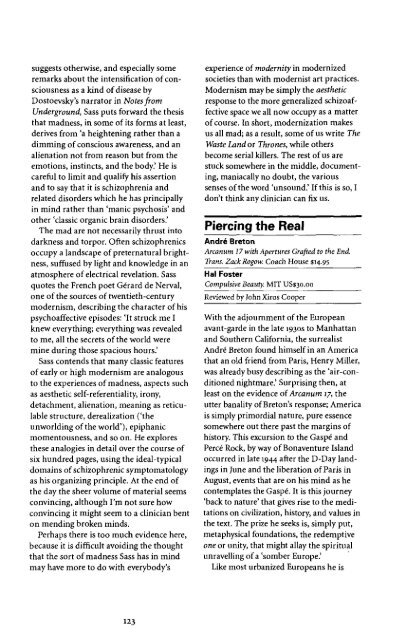Jean Rivard - University of British Columbia
Jean Rivard - University of British Columbia
Jean Rivard - University of British Columbia
Create successful ePaper yourself
Turn your PDF publications into a flip-book with our unique Google optimized e-Paper software.
suggests otherwise, and especially some<br />
remarks about the intensification <strong>of</strong> consciousness<br />
as a kind <strong>of</strong> disease by<br />
Dostoevsky's narrator in Notes from<br />
Underground, Sass puts forward the thesis<br />
that madness, in some <strong>of</strong> its forms at least,<br />
derives from 'a heightening rather than a<br />
dimming <strong>of</strong> conscious awareness, and an<br />
alienation not from reason but from the<br />
emotions, instincts, and the body.' He is<br />
careful to limit and qualify his assertion<br />
and to say that it is schizophrenia and<br />
related disorders which he has principally<br />
in mind rather than 'manic psychosis' and<br />
other 'classic organic brain disorders.'<br />
The mad are not necessarily thrust into<br />
darkness and torpor. Often schizophrenics<br />
occupy a landscape <strong>of</strong> preternatural brightness,<br />
suffused by light and knowledge in an<br />
atmosphere <strong>of</strong> electrical revelation. Sass<br />
quotes the French poet Gérard de Nerval,<br />
one <strong>of</strong> the sources <strong>of</strong> twentieth-century<br />
modernism, describing the character <strong>of</strong> his<br />
psychoaffective episodes: 'It struck me I<br />
knew everything; everything was revealed<br />
to me, all the secrets <strong>of</strong> the world were<br />
mine during those spacious hours.'<br />
Sass contends that many classic features<br />
<strong>of</strong> early or high modernism are analogous<br />
to the experiences <strong>of</strong> madness, aspects such<br />
as aesthetic self-referentiality, irony,<br />
detachment, alienation, meaning as reticulable<br />
structure, derealization ('the<br />
unworlding <strong>of</strong> the world'), epiphanic<br />
momentousness, and so on. He explores<br />
these analogies in detail over the course <strong>of</strong><br />
six hundred pages, using the ideal-typical<br />
domains <strong>of</strong> schizophrenic symptomatology<br />
as his organizing principle. At the end <strong>of</strong><br />
the day the sheer volume <strong>of</strong> material seems<br />
convincing, although I'm not sure how<br />
convincing it might seem to a clinician bent<br />
on mending broken minds.<br />
Perhaps there is too much evidence here,<br />
because it is difficult avoiding the thought<br />
that the sort <strong>of</strong> madness Sass has in mind<br />
may have more to do with everybody's<br />
experience <strong>of</strong> modernity in modernized<br />
societies than with modernist art practices.<br />
Modernism may be simply the aesthetic<br />
response to the more generalized schizoaffective<br />
space we all now occupy as a matter<br />
<strong>of</strong> course. In short, modernization makes<br />
us all mad; as a result, some <strong>of</strong> us write The<br />
Waste Land or Thrones, while others<br />
become serial killers. The rest <strong>of</strong> us are<br />
stuck somewhere in the middle, documenting,<br />
maniacally no doubt, the various<br />
senses <strong>of</strong> the word 'unsound.' If this is so, I<br />
don't think any clinician can fix us.<br />
Piercing the Real<br />
André Breton<br />
Arcanum 17 with Apertures Grafted to the End.<br />
Trans. Zack Rogow. Coach House $14.95<br />
Hal Foster<br />
Compulsive Beauty. MIT US$30.00<br />
Reviewed by John Xiros Cooper<br />
With the adjournment <strong>of</strong> the European<br />
avant-garde in the late 1930s to Manhattan<br />
and Southern California, the surrealist<br />
André Breton found himself in an America<br />
that an old friend from Paris, Henry Miller,<br />
was already busy describing as the 'air-conditioned<br />
nightmare.' Surprising then, at<br />
least on the evidence <strong>of</strong> Arcanum 17, the<br />
utter banality <strong>of</strong> Breton's response; America<br />
is simply primordial nature, pure essence<br />
somewhere out there past the margins <strong>of</strong><br />
history. This excursion to the Gaspé and<br />
Percé Rock, by way <strong>of</strong> Bonaventure Island<br />
occurred in late 1944 after the D-Day landings<br />
in June and the liberation <strong>of</strong> Paris in<br />
August, events that are on his mind as he<br />
contemplates the Gaspé. It is this journey<br />
'back to nature' that gives rise to the meditations<br />
on civilization, history, and values in<br />
the text. The prize he seeks is, simply put,<br />
metaphysical foundations, the redemptive<br />
one or unity, that might allay the spiritual<br />
unravelling <strong>of</strong> a 'somber Europe.'<br />
Like most urbanized Europeans he is<br />
123

















